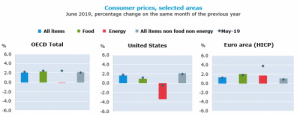Finance & Economics
Consumer Prices, OECD - Updated: 6 August 2019

- Read more
- 227 reads
The Federal Democratic Republic of Ethiopia Implements the International Monetary Fund’s Enhanced General Data Dissemination System
The Federal Democratic Republic of Ethiopia has implemented the recommendations of the IMF’s Enhanced General Data Dissemination System (e-GDDS) by publishing critical data through the National Summary Data Page (NSDP). The page aims to serve as a one-stop publication vehicle for essential macroeconomic data on the national accounts, government operations and debt, monetary and financial sector, and the balance of payments. These data will be disseminated in both human and machine-readable formats. The e‑GDDS was established by the IMF’s Executive Board in May 2015 to support improved data transparency, encourage statistical development, and help create synergies between data dissemination and policymaking.
- Read more
- 259 reads
IMF Executive Board Concludes 2019 Article IV Consultation with Zambia
On July 24, 2019, the Executive Board of the International Monetary Fund (IMF) concluded the Article IV consultation with Zambia.
Zambia’s development strategy has focused on a rapid-scaling up of public investment to address the country’s infrastructure needs.
- Read more
- 281 reads
World Bank and Japan Support Vietnam to Improve Tax System Effectiveness
The World Bank and the State Bank of Vietnam, on August 2, signed a financing agreement for a grant worth US$4.2 million provided by the Japanese Government to implement the Revenue Administration Reform Support Project.
- Read more
- 296 reads
Hungary must enforce its foreign bribery offence against companies, including foreign subsidiaries
The Working Group is concerned that Hungary has not commenced any foreign bribery investigations or prosecutions in over nine years since the Phase 3 evaluation of implementation of the OECD Anti-Bribery Convention. However, the companies operating in the country have significant exposure to export-related risks of the bribery of foreign public officials. This includes foreign subsidiaries of multinational enterprises (MNEs) that use Hungary as a manufacturing base and re-export goods to other markets. To avoid Hungary becoming a safe harbour for MNEs with subsidiaries in Hungary that commit bribery abroad, the authorities must overcome their reluctance to enforce relevant criminal legal provisions and assign responsibility to detect and investigate such bribery.
- Read more
- 268 reads
IMF Executive Board Concludes 2019 Article IV Consultation with Somalia
On July 22, 2019, the Executive Board of the International Monetary Fund (IMF) concluded the 2019 Article IV consultation with Somalia.
Improved confidence, on the back of the continued implementation of reforms, and strong donor support continue to support economic activity, especially in the telecom, trade, construction, and financial sectors. However, poor rainfall in Spring weighs on the outlook and threatens food security.
- Read more
- 247 reads
Macroeconomic Management Weakens While Social Inclusion Policies Improve Slightly in Africa’s Poorest Countries
Africa’s poorest countries saw little to no progress on average in improving the quality of their policy and institutional frameworks in 2018, according to the World Bank’s annual Country Policy and Institutional Assessment (CPIA) released on July 31.
- Read more
- 258 reads
IMF Executive Board Concludes 2019 Article IV Consultation with Indonesia
On July 3, 2019, the Executive Board of the International Monetary Fund (IMF) concluded the Article IV consultation with Indonesia.
The Indonesian economy performed well in 2018, despite external headwinds, including capital flow reversals. Growth stabilized at above 5 percent, as robust domestic demand offset a decline in net exports.
- Read more
- 259 reads
World Bank Reaffirms Support for Mongolia’s Reforms with US$100 Million Financing
The World Bank’s Board of Directors, on July 30, approved US$100 million in financing to help Mongolia further stabilize its economy and move it towards a more sustainable development path. The Second Economic Management Support Operation (EMSO 2) follows on EMSO 1 approved in November 2017, and supports policy reforms aimed at restoring debt sustainability, strengthening the social protection system, and enhancing competitiveness.
- Read more
- 262 reads
IMF Executive Board Concludes Article IV Consultation with the Republic of Lithuania
On July 30, 2019, the Executive Board of the International Monetary Fund (IMF) concluded the Article IV consultation with the Republic of Lithuania and considered and endorsed the staff appraisal without a meeting.
- Read more
- 243 reads
Human Rights
Ringing FOWPAL’s Peace Bell for the World:Nobel Peace Prize Laureates’ Visions and Actions

Protecting the World’s Cultural Diversity for a Sustainable Future

The Peace Bell Resonates at the 27th Eurasian Economic Summit

Declaration of World Day of the Power of Hope Endorsed by People in 158 Nations

Puppet Show I International Friendship Day 2020

